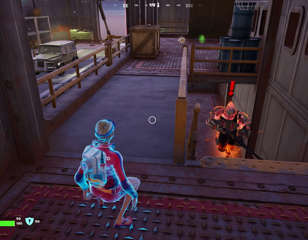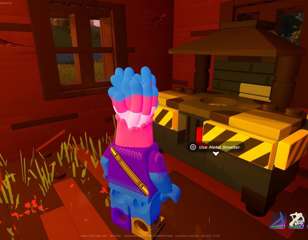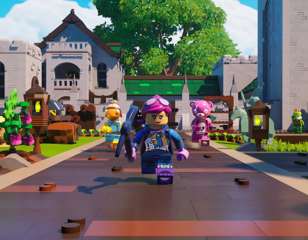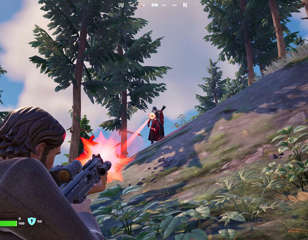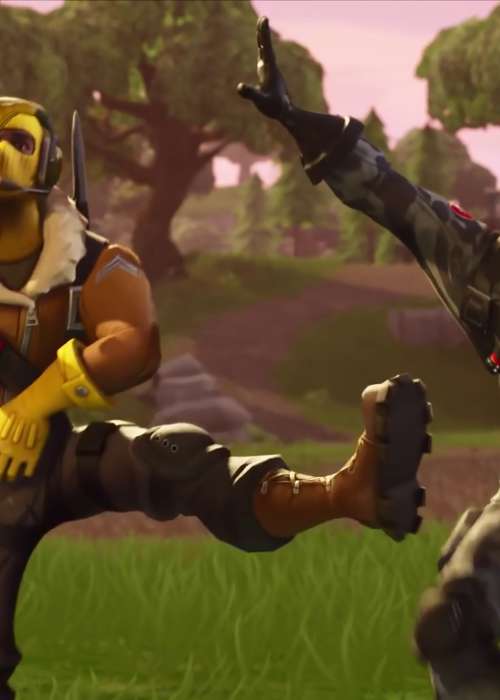
What Is Griefing? Fortnite's Unwritten Rule
Find out what it means to be “griefed” in Fortnite
This is part of the ‘Fortnite’ directory
Directory contents
Griefing is an issue across many games, but it’s especially problematic in a battle royale like Fortnite.
Fortnite as a whole is just prime for griefers. The game’s genre, the average age of the competitors, and the massive prize pools all work together to create a recipe for disaster. The pressure and spotlight these young players have on them can fuel some truly abhorrent and toxic behaviour.
You’ve probably heard the term griefing before, but what exactly does it mean to grief or be griefed in Fortnite?

What Is Griefing?
The definition of griefing is somewhat ambiguous. At its core, griefing is an act performed by one player to harass or disrupt the game of another player. Think trolling, but more spiteful.
Basically, any action performed by a player that is to the determinant of both themself and the enemy player can fall under the umbrella of griefing. Rather than playing for one’s own best interest, a griefer will act with the intent to ruin someone else’s game.
How Many Forms Of Griefing are There?
The most prominent form of griefing in competitive Fortnite involves a losing player intentionally ruining a match for someone on top of a tournament’s leaderboard. Typically, the griefing player’s tournament is over. They haven’t performed up to their expectations and they no longer have a chance to win. So instead of taking their loss in stride, they go out of their way to sabotage another player.
This process usually involves the griefer dropping on top of the player they are trying to grief. The griefer may have been landing at a different location all tournament, and then suddenly they’ll change their drop spot to the same point of interest (POI) as another participant. The griefer does not care if they die because their own tournament is over anyway. Their sole mission is to eliminate their target, and ruin that player’s tournament standing.
Other minor forms of griefing include stuff like Storm fighting and kamikaze attacks on enemies with explosives. Most Fortnite players have probably had an opponent relentlessly chase them into the Storm. Griefers will pursue a kill endlessly, even if it ends with both parties dying. Finishing a kill is one thing, but chasing someone deep into the Storm to the detriment of one’s self is griefing.
Shooting an RPG at the ground to kill both you and another player could be considered griefing. You knew the RPG was going to kill you, but you didn’t care. If you're dying, you are going to take an enemy with you.
These minor forms of griefing are not exclusive to Fortnite tournaments. Even casual players have likely run into this sort of griefing.

Historic Examples Of Griefing
The most recent example of griefing in a major Fortnite event occurred just a few days ago. An Australian pro by the name of LunR was in first place heading into the final match of the FNCS All-Star Showdown Solo Grand Finals. Another player, RIVLEE_, decided it was time to make LunR the target of a grief attempt.
RIVLEE_ followed LunR to Stealthy Stronghold and eliminated LunR off spawn, effectively ending LunR’s chances at first-place. RIVLEE_ had not visited Stealthy Stronghold a single time the whole tournament. It was only once RIVLEE_’s tournament hopes were squandered that he decided to contest LunR.
There’s no debating that this sequence was intentional. RIVLEE_ himself even took to Twitter to take responsibility for his actions. RIVLEE_ admits to griefing LunR, claiming that he was peer pressured by other players.
One of the most famous incidents of griefing in Fortnite history occurred between Dominick “Unknown” Green and Cody “Clix” Conrad. Both of these competitors have prestigious resumes, so their beef obviously drew a lot of attention.
It all started when Clix eliminated Unknown in the Chapter 2 - Season 2 FNCS Invitational. Clix got a little rowdy after the kill and performed an emote on Unknown’s corpse. This triggered Unknown, who stated afterwards that he would go for revenge on Clix in the next match.
Unknown followed through on his promise and followed Clix to Pleasant Park. Luckily for Clix, he got word of Unknown’s plans prior to the match and was able to avoid the sabotage attempt. Still, this did not deter Unknown. The vengeful controller pro swore to hunt down Clix again in the next match.
As one may expect, Clix did not take Unknown’s attempts to grief him well. Clix booted up a live stream to vent his frustrations. Clix stated, “this is a million-dollar tournament… first place is $100K. I'm in the top 15 going into the last game.” Clix carried on, “just cause I sniped this kid and danced as a joke... he has 30,000 viewers, and he’s teaching the kids that watch that it’s okay to cheat.”
After much online deliberation between the two parties, Unknown acknowledged the error of his ways and did not follow through on a second attempt to grief Clix. Still, the rivalry started a rift through the Fortnite community...
Pros And Content Creators Speak Out On Griefing
The prevalence of griefing in competitive Fortnite has sparked quite a discussion across the gaming community. Household names such as Tyler “Ninja” Blevins and Jaryd "Summit1g" Lazar have taken to Twitter to voice their opinions on the matter.
Ninja released a short video to Twitter calling out the griefers. In it, Ninja states, “don’t grief players, because your tournament is over. Don’t land somewhere else and try to ruin someone else’s tournament because you choked or sucked, and now can’t qualify.”
Ninja expresses the need for Fortnite competitors to show some empathy for one another. “You don’t even know what you’re doing. What if this person needs this money? Like, you don’t know what they’re going through, what their family is going through, especially in a time like this man. People aren’t even comprehending that.”
Ninja’s statement could not be any more appropriate considering the reaction we saw from LunR, the most recent victim of a public griefing scandal. LuhR brokedown on stream after the incident, discussing the affair while openly crying. The actions of one immature player cost LunR thousands of dollars along with his emotional wellbeing.
Summit1g took on the role of Devil’s advocate in the griefing debate. Speaking in regards to the Unknown vs. Clix situation, Summit1g asked the question: "So if I'm playing Fornite in an event. Someone kills me and dances on my body. I get heated and happen to know their preferred landing locations. I'm not allowed to go after him in the next round?" Actions some see as griefing, Summit1g simply sees as part of the game.
Is Griefing Illegal?
Everyone has their opinions, but Epic Games is the final judge and jury. And so far, it seems like they hold Summit1g’s view on griefing.
Griefing is technically not against the rules. If a participant does not flat-out admit to griefing, it is near impossible to prove or enforce.
Epic Games would probably rather witness suspected griefing than the opposite. Epic Games has taken a firm stance on collusion, including actions like planned movement. This includes agreements by opposing players to avoid landing away from one another.
In Epic’s eyes, contested drops are just part of the game. As tournament administrators, Epic cannot punish participants for where they land. This type of griefing is just an unfortunate side effect of competitive play in the battle royale genre.
In the end, griefing is not officially against the rules, but it’s an extremely frowned upon act. Competitors usually abide by the unwritten rule not to grief one another. However, there’s always the chance that a rogue villain will appear and break this player code.
No one likes to be griefed, but due to the nature of Fortnite and video games in general, the toxic act is here to stay.

About The Author
Coleman Hamstead
Coleman is a freelance journalist at GGRecon. While gaming has always been his passion, it wasn’t until he worked as a Sports Journalist at the Community College of Baltimore County that he found his enthusiasm for writing. In the time since Coleman has had his work featured in publications such as The Washington Post/Launcher and ESTNN. Coleman is a graduate of Towson University with a degree in Sport Management and Business Administration.
This is part of the ‘Fortnite’ directory
Directory contents







